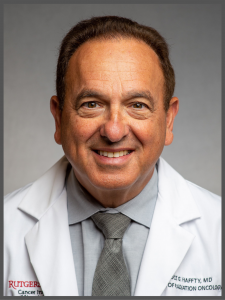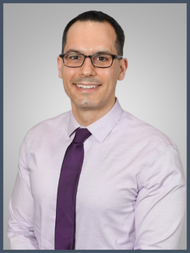Medical Residency Program
Program Structure and Curriculum

Professor and Chair Dept. of Radiation Oncology
Associate Vice Chancellor Cancer Programs Rutgers Biomedical and Health
Program Director Medical Residency Program hafftybg@cinj.rutgers.edu
Clinical rotations are organized by disease site, which allows residents to learn each site in depth with the guidance of a sub-specialist. All rotations follow either a 1:1 or 2:1 attending/resident model. Rotations occur at Robert Wood Johnson University Hospital in New Brunswick, University Hospital in Newark, Saint Barnabas Medical Center in Livingston or the East Orange Veteran’s Affairs Hospital. Each site has a different clinical emphasis and patient population resulting in wide variety of experiences for our residents.
Over the course of clinical years, residents rotate through many disease sites. The curriculum comprises breast, genitourinary/gynecological, thoracic, gastrointestinal, central nervous system, head and neck, pediatric/lymphoma and sarcoma/cutaneous rotations. Residents are given the opportunity to complete more than one rotation block in sites of particular interest.
Residents evenly split weekly home call. Duties of the on-call resident include handling in-patient consults specific to radiation treatment, as well as night-time patient questions. Residents always have the support of an on-call attending.
Academic Excellence
We have a strong track record of first attempt passing of the written and oral qualifying examination. We believe this is due to the rigorous clinical experience that trainees are exposed to during residency. The training program begins after the completion of a preliminary or transitional PGY I year and consists of four years total. Residents will complete a minimum of 36 months of clinical rotation, which is broken into two-month blocks. A minimum of 6 months of research elective is also guaranteed, with ability to apply and escalate this to a full 12 months of research elective.
Mission

Assistant Professor
Associate Program Director Medical Residency Program nd883@cinj.rutgers.edu
- Our primary goal at Rutgers is to train exceptional clinicians. This is our entire team’s top priority. Residents graduating from our program should have the experience and confidence to practice in any setting, whether as an academic Sub-Specialist or a general community Radiation Oncologist.
- Our secondary goal is to nurture academic inquiry and resident research, with equal emphasis on all areas of investigation including bench research, clinical trials, translational research, health care policy and economics.
- Our final goal is to train tomorrow’s leaders. Given our extensive mentoring program and access to current leaders in the field, we hope to inspire the next generation of Radiation Oncologists.
Didactics
Formal didactics in our training program is fairly unique, with Friday’s being solely dedicated to protected educational activities. This includes various rotating events such as morning report, where residents discuss clinical management of patients, journal club or attending led clinical didactics. Every Friday also includes formal physics and radiation biology instruction, lead by nationally renowned scientists. Finally, every Friday includes the much loved, resident-led planning rounds – an event where residents teach each other, and the entire department, about the clinical nuances they have learned from each week’s new cases.
Research Opportunities
Research activities are divided among the Divisions of Clinical Radiation, Medical Physics and Radiation Cancer Biology. All faculty are active in academic pursuits which include trial creation and enrollment, grant writing and peer review. Resident opportunities for clinical, bench and translational research exist, and all such endeavors are supported equally. We encourage applicants with advanced degrees such as PhD, MS or MBA to apply.
Rutgers Cancer Institute of New Jersey’s physician-scientists engage in translational research, transforming their laboratory discoveries into clinical practice, outsmarting cancer with science. Our center is a matrix style, basic, clinical and population research center as well as a consortium cancer center with Rutgers University and Princeton University leveraging the science of the state’s cancer researchers through collaboration.
Rutgers Cancer Institute of New Jersey is sharply focused on fulfilling the cancer research needs of the most densely populated and industry rich state in the nation. Our programs and core facilities enhance and support the cancer research of more than 230 members at Rutgers University, Princeton University and the Institute for Advanced Study in Princeton.
Medical Student Opportunities
We offer clerkship opportunities for third year and fourth year Rutgers Medical Students and visiting clerkships to medical students in their fourth year of a US accredited medical school.
For further information about the Visiting Clerkship Program
or to receive an application, please contact our residency program coordinator.
Susan Niedzinski
Residency Program Coordinator
Department of Radiation Oncology
Rutgers Robert Wood Johnson Medical School
Rutgers Cancer Institute of New Jersey
Rutgers, The State University of New Jersey
Email: sn445@cinj.rutgers.edu
Phone: 732-253-3956

